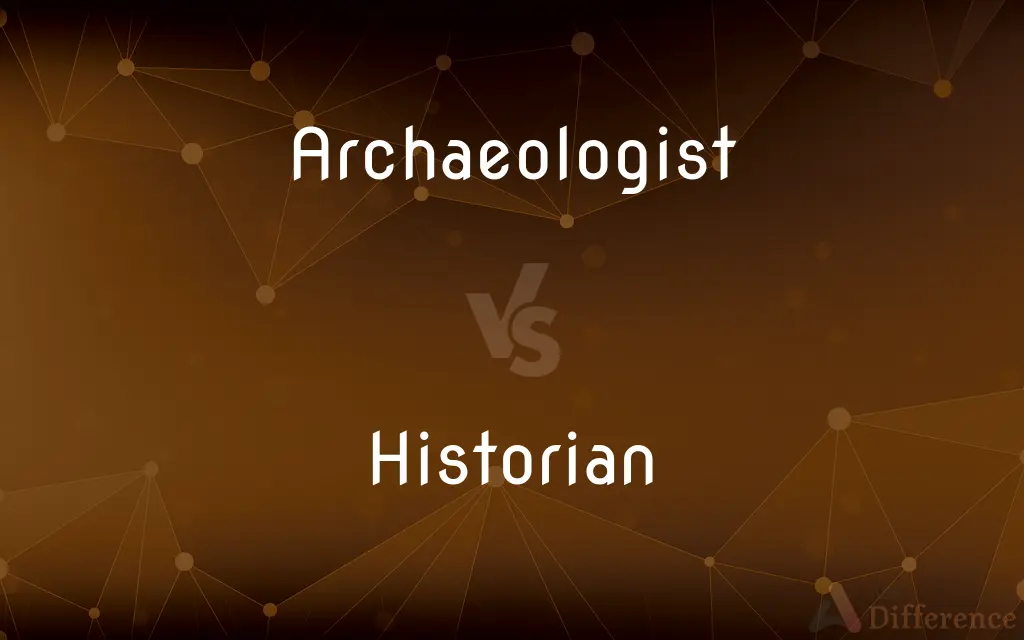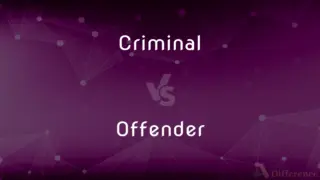Archaeologist vs. Historian — What's the Difference?
Edited by Tayyaba Rehman — By Fiza Rafique — Updated on March 20, 2024
Archaeologists study past human cultures through material remains, while historians analyze written records to understand historical events.

Difference Between Archaeologist and Historian
Table of Contents
ADVERTISEMENT
Key Differences
Archaeologists delve into the past by examining physical remains such as artifacts, structures, and landscapes to understand human cultures and societies. They often conduct excavations to uncover these materials, relying on physical evidence to piece together past ways of life. Historians, on the other hand, primarily analyze written records and documents to construct narratives and interpretations of past events. They depend on textual evidence, such as letters, official documents, and literature, to understand historical contexts and changes over time.
While archaeology provides a tangible connection to the past through objects and environmental evidence, offering insights into societies that may not have left written records, history focuses on societies with writing systems and documented records. Archaeologists often use dating methods like carbon-14 dating to estimate the age of their finds, whereas historians may use chronologies based on documented events and dates.
The work of archaeologists can complement historical research by filling in gaps left by the historical record, especially for periods or areas with scant written sources. Conversely, historians can provide context for archaeological findings, linking artifacts and structures to known historical events or periods.
Archaeologists and historians both contribute to our understanding of the past, but they approach it from different angles: archaeologists through the physical remnants of past societies, and historians through the narrative and analysis of written records. This distinction highlights the interdisciplinary nature of studying history, where material culture and textual evidence together illuminate the human experience.
Collaboration between archaeologists and historians is common, especially in fields like historical archaeology, where researchers use both archaeological and historical methods to investigate the recent past. This synergy allows for a more comprehensive understanding of historical periods, especially those with both extensive material remains and written records.
ADVERTISEMENT
Comparison Chart
Primary Sources
Material remains: artifacts, structures, landscapes.
Written records: letters, documents, literature.
Focus
Human cultures and societies through physical evidence.
Historical events, narratives, and contexts through texts.
Methods
Excavations, carbon-14 dating, artifact analysis.
Textual analysis, chronological dating, interpretive analysis.
Contribution
Unveils the physical aspects of past societies.
Constructs narratives of the past based on documents.
Fields of Study
Prehistory, ancient civilizations, material culture.
Political, social, economic history, etc.
Time Period
All periods, especially effective before written records.
Primarily periods with written records.
Collaboration
Often works with historians to provide a fuller picture.
Uses archaeological findings to add depth to historical narratives.
End Goal
Understanding human past through material culture.
Understanding human past through narratives and contexts.
Compare with Definitions
Archaeologist
Focuses on tangible evidence of the past.
Archaeologists analyze artifacts to understand daily life in ancient times.
Historian
Integrates archaeology to fill in history gaps.
Historians sometimes rely on archaeological evidence to corroborate texts.
Archaeologist
Contributes to understanding prehistoric societies.
Archaeologists provide insights into societies without written records.
Historian
Analyzes texts to construct historical narratives.
Historians decipher ancient manuscripts to understand historical contexts.
Archaeologist
A professional who studies ancient cultures through their material remains.
The archaeologist unearthed pottery indicating a thriving trade.
Historian
Focuses on documented periods of history.
Historians often specialize in a specific era, like the Renaissance.
Archaeologist
Uses scientific methods to date findings.
Carbon-14 dating allows archaeologists to estimate the age of organic artifacts.
Historian
Uses chronological analysis to understand timelines.
Chronological analysis helps historians place events in proper sequence.
Archaeologist
Often conducts fieldwork through excavations.
Fieldwork is crucial for archaeologists to discover new historical sites.
Historian
An expert who interprets past events through written records.
The historian used medieval texts to study the feudal system.
Archaeologist
The systematic study of past human life and culture by the recovery and examination of remaining material evidence, such as graves, buildings, tools, and pottery.
Historian
A historian is a person who studies and writes about the past and is regarded as an authority on it. Historians are concerned with the continuous, methodical narrative and research of past events as relating to the human race; as well as the study of all history in time.
Archaeologist
Someone who studies or practises archaeology.
Historian
A scholar or writer of history.
Archaeologist
One versed in archæology; an antiquary.
Historian
One who writes or compiles a chronological record of events; a chronicler.
Archaeologist
An anthropologist who studies prehistoric people and their culture
Historian
A writer of history; a chronicler; an annalist.
Historian
One who studies or researches history.
Historian
(medicine) One who recounts their own medical history.
Historian
A writer of history; a chronicler; an annalist.
Even the historian takes great liberties with facts.
Historian
One versed or well informed in history.
Great captains should be good historians.
Historian
A person who is an authority on history and who studies it and writes about it
Common Curiosities
How do historians contribute to our understanding of the past?
Historians interpret written records to construct narratives and analyses of past events, offering insights into human thoughts, actions, and societies.
Do archaeologists only study ancient civilizations?
While archaeologists often focus on ancient civilizations, they also study more recent historical periods, including those with written records.
What is historical archaeology?
Historical archaeology is a field that uses both archaeological and historical methods to study periods and places with written records.
What distinguishes an archaeologist from a historian?
Archaeologists study past societies through material remains, while historians analyze written documents to understand the past.
Can archaeologists and historians work together?
Yes, archaeologists and historians often collaborate, with archaeology providing physical evidence that can support or redefine historical narratives.
Why is textual evidence important for historians?
Textual evidence provides direct insights into the thoughts, languages, and dynamics of past societies, crucial for constructing accurate historical narratives.
Are archaeologists considered scientists?
Yes, archaeologists are considered scientists as they employ scientific methods to analyze physical evidence from past human societies.
Can historical research influence archaeological digs?
Yes, historical research can guide archaeological digs by suggesting locations and contexts where significant material evidence may be found.
What role does carbon-14 dating play in archaeology?
Carbon-14 dating is a scientific method used by archaeologists to determine the age of organic materials, helping to date archaeological finds.
How do archaeologists and historians study societies without written records?
Archaeologists study these societies through material remains, while historians might rely on oral histories or interpretations of archaeological data.
Share Your Discovery

Previous Comparison
Difficultly vs. Difficulty
Next Comparison
Criminal vs. OffenderAuthor Spotlight
Written by
Fiza RafiqueFiza Rafique is a skilled content writer at AskDifference.com, where she meticulously refines and enhances written pieces. Drawing from her vast editorial expertise, Fiza ensures clarity, accuracy, and precision in every article. Passionate about language, she continually seeks to elevate the quality of content for readers worldwide.
Edited by
Tayyaba RehmanTayyaba Rehman is a distinguished writer, currently serving as a primary contributor to askdifference.com. As a researcher in semantics and etymology, Tayyaba's passion for the complexity of languages and their distinctions has found a perfect home on the platform. Tayyaba delves into the intricacies of language, distinguishing between commonly confused words and phrases, thereby providing clarity for readers worldwide.
















































